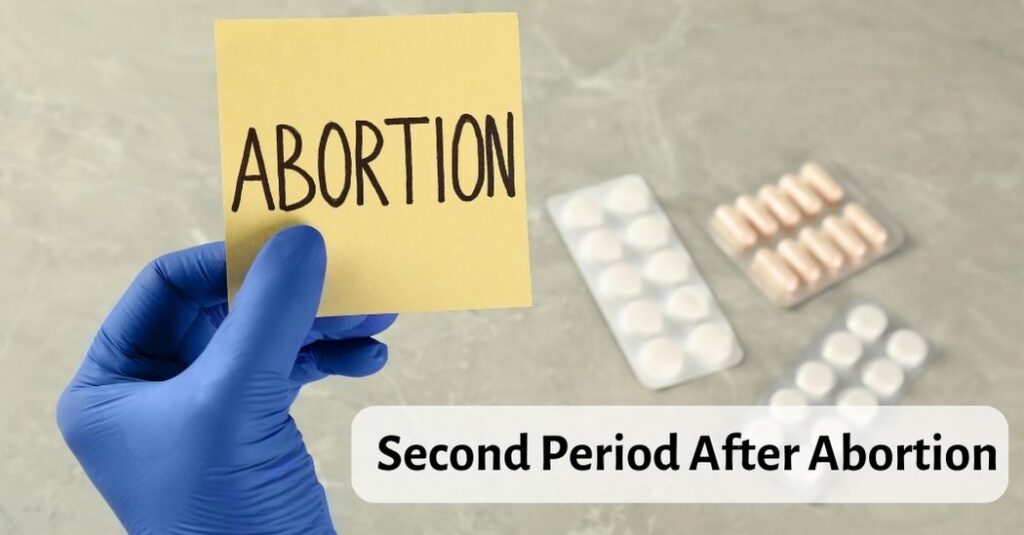Fundamentals of Abortion and its Effect on the Menstrual Cycle
When you think about an abortion, the first thing that probably crosses your mind is “How long until things go back to normal?”. Your uterus has the same question. In the case of a medical abortion, the uterine lining patiently waits for the bleeding to cease before it starts to rebuild itself. It’s kind of like a home renovation project – you don’t start to rebuild until the demolition is done.

Post-Abortion Recovery and Its Influence on Menstruation
With surgical abortion, the body acts like a speedy construction team. Once the fetal tissue (the metaphorical rubble) is cleared out, the body gets to work on building that uterine lining back up. Typically, this process will take about 3 to 4 weeks.
That’s roughly the same amount of time it takes to assemble IKEA furniture, so you’re not alone if you feel it’s taking a bit longer than expected.
Taking care of your body is important during the post-abortion recovery period. It’s like sending your body on a wellness retreat after a big project. Getting plenty of rest, maintaining a healthy diet, and engaging in gentle exercises supports your body’s healing process. Remember, everyone’s body is unique, and it may take some time to fully recover.
Characteristics of the First Period After an Abortion
Like the first pancake in the batch, the first period after an abortion might not be perfect.
- Timing: The first period generally kicks off about 3 to 4 weeks after the bleeding from the abortion has ended. This timing may vary depending on individual factors and the type of abortion procedure you underwent. Monitoring your cycle and noting any significant deviations from this general timeframe can be helpful.
- Heavier Flow: Due to the hormonal changes and the body’s healing process, you may experience a heavier than usual period after an abortion. This is normal and is a sign that your body is expelling any remaining tissue from the uterus.
- Irregularities: The first period after an abortion might not be like your regular cycle. You might notice differences in the duration, flow, or pain level associated with your period. Understanding that this is a common occurrence can alleviate any unnecessary anxiety.
- Emotional Impact: Hormonal changes heighten emotional responses, and it can feel like a significant milestone in your recovery journey.
- Physical Discomfort: Some women report experiencing more discomfort or pain during their first period post-abortion. If pain becomes severe or you’re concerned about your symptoms, do reach out to your healthcare provider.
Predicting the Second Period After Abortion: What to Expect
After that, you can expect your cycle to get back on track. I mean, let’s face it, your body is no rookie at this. It knows the drill and it’s ready to get back into the rhythm. Depending on individual health conditions and circumstances, you should anticipate your second period after abortion by the end of the month following the procedure.
After the first cycle, your body will continue its recovery process and attempt to restore regularity in your menstrual cycle. By the time of the second period after abortion, some women might experience a perfectly normal cycle, others may still face slight irregularities.
Factors such as the type of abortion, pre-existing health conditions, and overall physical and mental health influence this process.
In some cases, the second period after an abortion may be lighter or heavier than usual. If the flow during the second period after abortion is unusually heavy or the bleeding lasts longer than your typical cycle, it’s a good idea to consult with your healthcare provider.
Spotting or unusually light periods can also occur and are usually no cause for alarm unless accompanied by other concerning symptoms.
Role of Hormones in Regulating Menstrual Cycle Post-Abortion
Hormones are like the stage directors of the body’s menstrual show. During pregnancy, they were producing an abundance of ‘pregnancy hormones’ in preparation for the fetus, like a stage director prepping for a big show.
After an abortion, these hormones can linger in the body for several weeks, occasionally messing with the regular scheduling. So, you might need to be a bit patient while your body re-adjusts to the regular programming.
Impact of Emotional Stress on Menstruation After an Abortion
Abortion can be like a roller-coaster ride for your emotions and your hormones. The stress from this experience can mess with your hormone balance and affect your menstrual cycle. It’s like adding a plot twist in your body’s script, but don’t worry – your body is a seasoned actress and will soon get back on track.
How Different Types of Abortion Affect Your Second Period
You see, the timing and the method of the abortion could make your second period after abortion a bit unique. Think of it like two different types of renovations: medical and surgical.
Post medical abortion, your first cycle may be heavier than usual, kind of like a deep clean after a messy project. After a surgical abortion, cycles usually occur at regular intervals but with a lighter flow, much like regular maintenance after a tidy-up.
Pre-existing Conditions and Their Effect on Menstruation After Abortion
Now if you already have certain conditions like Polycystic Ovary Syndrome (PCOS), your menstrual cycle might be irregular, much like your favorite sitcom that can’t stick to a schedule. But don’t fret, these conditions can be managed, and you’ll soon find your rhythm again.
Pre-existing conditions, such as endometriosis, can also significantly influence your post-abortion menstrual cycle. This condition may cause heavy bleeding and pain during periods, which might be further heightened after an abortion.
How to Regularize Your Menstrual Cycle After an Abortion
Abortion can be like a hurricane in the land of hormones. It throws everything off balance and it takes some time to get things back on track. Here are a few ways to help your body regularize its menstrual cycle after an abortion:
- Nutrition: After an abortion, your body needs fuel to rebuild itself. Think of nutrition as the construction materials your body needs. A balanced diet rich in iron, vitamins, and minerals aids in replenishing your energy and helps regularize your menstrual cycle.
- Hydration: Water is like the magic glue that holds everything together. It assists in flushing out toxins and maintaining hormonal balance. Keeping yourself well-hydrated supports your body in bouncing back to its normal cycle.
- Rest and Relaxation: Rest is the time when your body does most of its repair work. It’s like the night shift for your body’s construction team. Prioritizing sleep and finding ways to reduce stress aids your body in getting back on track.
- Exercise: Moderate exercise like Walking, Yoga is an effective way to manage stress, maintain hormonal balance, and manage potential weight gain, which is sometimes a concern for women, particularly those dealing with gaining weight after a miscarriage or an abortion.

Think of it as a fun team-building activity for your body’s hormones. It keeps them engaged and working together effectively.
Looking Ahead: Reproductive Health and Future Pregnancies After an Abortion
In the world of reproduction, an abortion can be like a reset button. Yes, it can be a tough experience, both physically and emotionally, but it doesn’t necessarily mean that future pregnancies are off the table. Here’s how to ensure your reproductive health after an abortion:
- Follow Up Care: Post-abortion check-ups are like your body’s performance reviews. They ensure that your body has recovered well from the procedure and help identify any potential issues. Keeping up with these appointments can go a long way in ensuring future reproductive health.
- Contraception: If you’re not ready for another pregnancy, contraception can be a reliable safeguard. It’s like the body’s bouncer, keeping unwanted pregnancies at bay.
- Emotional Wellbeing: Don’t forget, emotional health plays a significant role in reproductive health. Taking care of your emotional wellbeing, whether that’s through therapy, support groups, or self-care activities, is just as important as taking care of your physical health.
- Pre-Conception Care: When you’re ready for another pregnancy, pre-conception care can prepare your body for a healthy journey. It’s like a pre-flight checklist, ensuring that your body is ready for takeoff.
Wrapping it Up
As we conclude, I want to share a personal experience I recall from my early life. A dear friend of mine went through an abortion. She was in her 25, fresh out of uni, and starting her career. An unplanned pregnancy put her in a challenging position, and she decided to have an abortion.
It was a tough decision, filled with emotional turmoil and uncertainty. However, she approached her recovery period with grace and patience, taking each day as it came.
Her first period after the abortion was heavy and painful. It was different from anything she had previously experienced. Despite the discomfort, she was patient with herself, understanding that her body was healing.
Her second period, although a bit irregular, was less painful and more manageable. She faced some emotional ups and downs, which she tackled with the help of therapy and support from her loved ones.
What I learned from her experience is that every woman’s body is different, and every recovery process is unique. Patience and understanding are key in navigating the post-abortion period.
Taking care of your physical health by eating a balanced diet, staying hydrated, getting enough rest, and maintaining an exercise routine significantly aids your recovery process.
Moreover, never underestimate the power of emotional well-being. Reach out to your loved ones, join a support group, or seek therapy if necessary. Don’t hesitate to get professional help when needed. Remember, there’s no shame in asking for help.
Most importantly, be gentle with yourself. Your body has undergone a significant change, and it’s okay if it takes time to find its rhythm again. You’re strong, resilient, and capable of overcoming this. Just remember to take one day at a time.
FAQs on Second Period After Abortion
- Can my menstrual cycle return to normal after an abortion?
Yes, it typically does. It may take some time, but your menstrual cycle should return to its regular pattern after an abortion. However, if you notice any significant irregularities or are concerned, it’s always best to consult with your healthcare provider.
- How will I know if my menstrual cycle is irregular after an abortion?
An irregular cycle could mean your periods are more frequent, less frequent, heavier, or lighter than usual. If these changes persist for a few cycles or cause you concern, it’s best to seek advice from your healthcare provider.
- Will an abortion affect my future fertility?
In most cases, an abortion doesn’t affect future fertility. However, complications from an abortion, such as an infection, can potentially impact fertility. Regular follow-ups with your healthcare provider post-abortion can ensure any potential issues are caught early.
- What are the signs of complications after an abortion?
Signs of complications includes severe pain, heavy bleeding, fever, or foul-smelling vaginal discharge. If you experience any of these symptoms, seek immediate medical attention.
- How soon can I start exercising after an abortion?
Typically, it’s safe to start light activities a few days after the abortion, but it’s always best to follow your healthcare provider’s advice. They will give you personalized recommendations based on your health and the specifics of your procedure.
References: